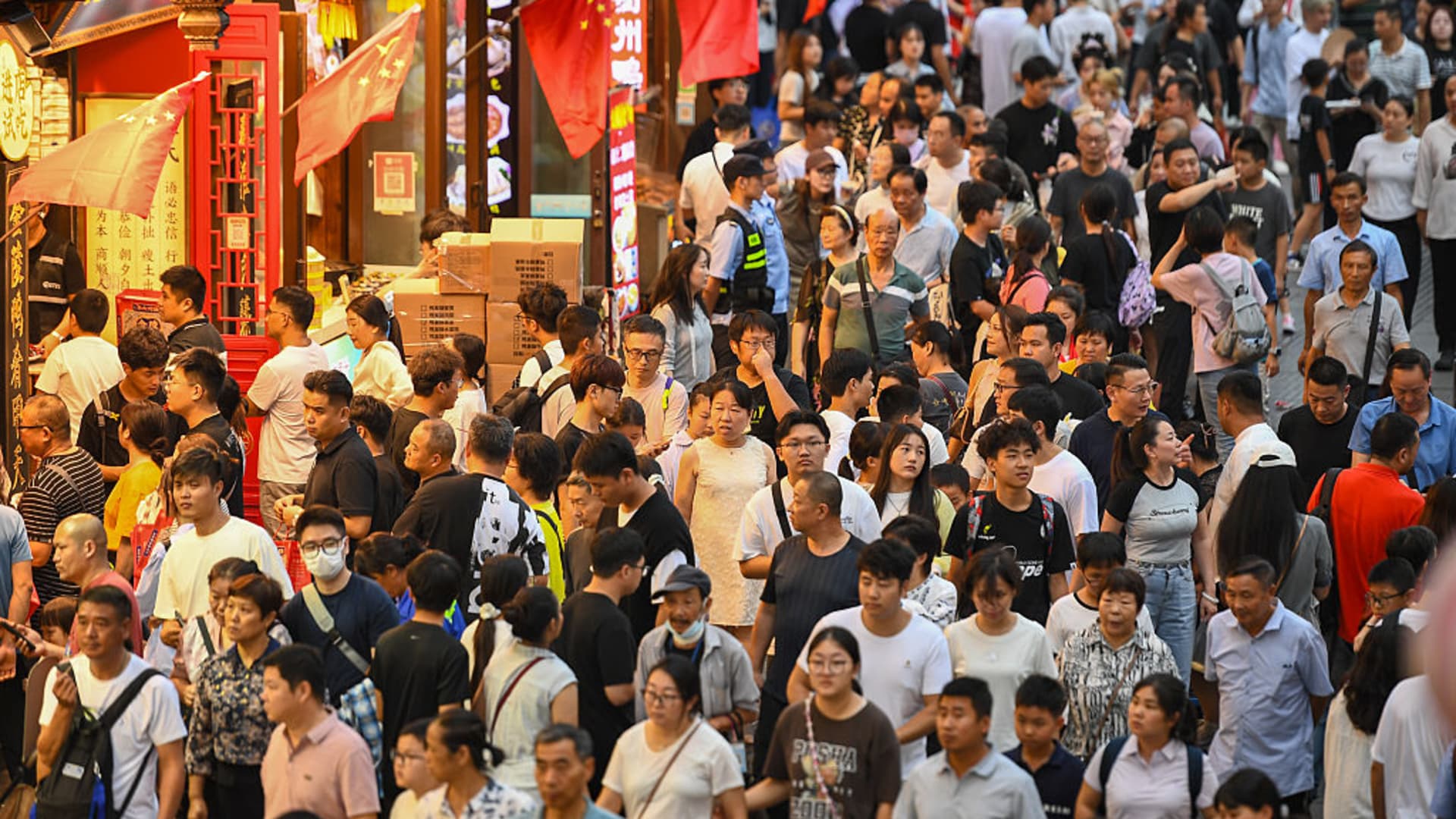Tourists visit the Confucius Temple market area in Nanjing, Jiangsu province, China, on Oct. 1, 2025.
Cfoto | Future Publishing | Getty Images
BEIJING — The latest sign of hyper-competition, or “involution,” has emerged in China’s tourism industry, adding to concerns about growing deflationary pressure in the broader economy.
Over the Oct. 1 to 8 public holiday — dubbed “Golden Week” — total domestic tourism trips reached 888 million and generated 809.01 billion yuan ($113.63 billion) in revenue, according to official data released Thursday. That’s up by 1.8% and 7.6% from last year, respectively, according to CNBC’s calculations of the figures.
The gains, however, slowed from the May 1–5 holiday earlier this year, when domestic trips and tourism revenue grew 6.4% and 8% respectively. In fact, average spending per domestic tourist trip during the Golden Week was also around 3% lower than in 2019 before the pandemic, Goldman Sachs pointed out Thursday.
“The Golden Week was ‘Golden Weak,'” said Mix Shi, founder of PoshPacker Hostels Chengdu Group.
Although his three hostels in the city ended up being fully booked, Shi said he had to cut nightly rates by about 60% — because nearby hotels dropped prices even more.
“Way too much money has been pouring into the hotel industry lately,” Shi said, noting, “the competition is insane, and some really nice places are going for dirt cheap. It’s great for travelers because they have more choices, but it’s a real blow to hostels.”
Chengdu, the capital of Sichuan province in southwestern China, ranked second to Nanjing, capital of Jiangsu province in the east, in tourism spending for the holiday on the Meituan online booking platform.
Among local and international visitors to hostels in mainland China, Chengdu’s popularity more than doubled from last year’s Golden Week, second only to Shanghai, according to HostelWorld. Still, average bed prices fell more than 20% in both cities — to 165.70 yuan ($23.27) in Shanghai and 80.99 yuan in Chengdu.
While most locals have only a handful of paid days off each year, China has sought to encourage businesses to give workers more vacation days and extended official public holidays to boost consumption.
This year’s Golden Week was one day longer than usual because it coincided with the Mid-Autumn Festival, which follows the agrarian calendar. The festival fell on Oct. 6 this year, versus Sept. 17 last year.
“The Mid-Autumn Festival is considered to be a family reunion festival,” said AJ Wang, owner of the X Hotel and Observatory Hill House venues in the northeastern coastal city of Qingdao.
“The real Golden Week, in terms of revenue generation, actually ends on the 6th,” he said, noting he had to cut prices after that date by 60% due to falling demand.
Official domestic tourism revenue for the Golden Week alone rose by 15.4% from 2024, but when including last year’s Mid-Autumn Festival revenue figures, the comparable revenue growth slowed to 7.6%, CNBC calculations showed.
“Everyone’s working harder, spending more, but the profit gap stays small,” said Sasa Yau, who runs a hostel and restaurant in the southern city of Guangzhou.
Yau said his daily restaurant sales surged from the typical 3,000 yuan to as much as 10,000 yuan during the Golden Week, with the average customer spending just 30 yuan.
“We were busier than ever and broke our revenue record,” Yau said. “There are only four of us running the show, so by the end of the week we were so tired that when I said, ‘Let’s celebrate with a late-night meal!’ everyone just said, ‘Can we celebrate by sleeping instead?'”
Hunting for deals
In Chengdu, famous for its Giant pandas and spicy food, Shi said travelers tend to book rooms only a day or two in advance instead of a week or two ahead, making accommodation rates unpredictable
China’s vast network of high-speed trains and airports — with flights sometimes cheaper than train tickets — has made travelling on a whim fairly easy. Large price swings and challenges in booking tickets for the first or last day of a public holiday are pushing travelers to stagger their trips when possible — and save money.
Many tourists chose to travel slightly before or after the Golden Week period this year, according to Chinese travel booking site Trip.com. It noted that hotel prices in late September were about 20% cheaper than during the Golden Week, while mid-holiday airfares were more than 30% cheaper than at the start of the break.
Alibaba-owned travel booking site Fliggy said average spending per travel booking rose 14.6% from a year earlier, and noted that far cheaper flights started the weekend after the holiday, such as a flight from Shanghai to Hong Kong for less than 400 yuan ($56).
Official figures also pointed to a rise in road trips, with the holiday seeing an average of 304 million trips per day, mostly by car.
“The Golden Week unleashed a wave of energy across China: record-breaking travel, booming business activity, and fresh spending trends all gave domestic demand a solid boost,” said Bruce Pang, adjunct associate professor at CUHK Business School.
“Still, it might take a while before the [consumer price index] returns to positive [year-on-year] growth, as food prices and oil prices remain soft compared to their peak,” he said.
China’s official consumer prices fell by 0.4% in August from a year earlier but rose 0.9% when stripping out food and energy prices. The tourism sub-segment saw prices rise 0.7% year over year in August, but they were 0.3% lower for the January to August period compared with the same period in 2024.
Travel platforms also reported increased demand in smaller cities, where prices can be far lower. Chinese booking site Tongcheng said hotel bookings in at least 30 such cities and less developed areas more than doubled from a year ago.
China’s inflation data for September is due Oct. 15, and retail sales on Oct. 20. Retail sales rose just 3.4% in August from a year ago, missing analysts’ expectations.



